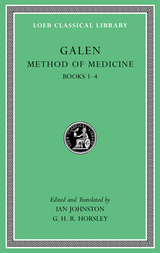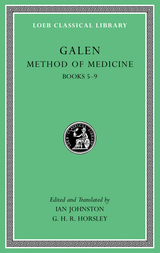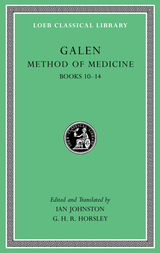
Antiquity’s most prolific and influential medical writer and practitioner.
Galen of Pergamum (129–?199/216), physician to the court of the emperor Marcus Aurelius, was a philosopher, scientist, medical historian, theoretician, and practitioner who wrote forcefully and prolifically on an astonishing range of subjects and whose impact on later eras rivaled that of Aristotle. Galen synthesized the entirety of Greek medicine as a basis for his own doctrines and practice, which comprehensively embraced theory, practical knowledge, experiment, logic, and a deep understanding of human life and society.
His treatise Hygiene, also known as “On the Preservation of Health” (De sanitate tuenda), was written during one of Galen’s most prolific periods (170–180) and ranks among his most important and influential works, providing a comprehensive account of the practice of preventive medicine that still has relevance today. Also included in this two-volume edition are two shorter treatises on the relationship between health and wellness. Thrasybulus explores the theoretical question of whether hygiene is part of medicine or gymnastics, and in so doing delineates the interrelated roles of doctors and physical therapists. On Exercise with a Small Ball strenuously advocates that activity’s superiority to all other forms of exercise.

Antiquity’s most prolific and influential medical writer and practitioner.
Galen of Pergamum (129–?199/216), physician to the court of the emperor Marcus Aurelius, was a philosopher, scientist, medical historian, theoretician, and practitioner who wrote forcefully and prolifically on an astonishing range of subjects and whose impact on later eras rivaled that of Aristotle. Galen synthesized the entirety of Greek medicine as a basis for his own doctrines and practice, which comprehensively embraced theory, practical knowledge, experiment, logic, and a deep understanding of human life and society.
His treatise Hygiene, also known as “On the Preservation of Health” (De sanitate tuenda), was written during one of Galen’s most prolific periods (170–180) and ranks among his most important and influential works, providing a comprehensive account of the practice of preventive medicine that still has relevance today. Also included in this two-volume edition are two shorter treatises on the relationship between health and wellness. Thrasybulus explores the theoretical question of whether hygiene is part of medicine or gymnastics, and in so doing delineates the interrelated roles of doctors and physical therapists. On Exercise with a Small Ball strenuously advocates that activity’s superiority to all other forms of exercise.

Antiquity’s most prolific and influential medical writer and practitioner.
Galen of Pergamum (129–?199/216), physician to the court of the emperor Marcus Aurelius, was a philosopher, scientist, and medical historian, a theoretician and practitioner, who wrote forcefully and prolifically on an astonishing range of subjects and whose impact on later eras rivaled that of Aristotle. Galen synthesized the entirety of Greek medicine as a basis for his own doctrines and practice, which comprehensively embraced theory, practical knowledge, experiment, logic, and a deep understanding of human life and society.
Method of Medicine is a systematic and comprehensive account of the principles of treating injury and disease and one of Galen’s greatest and most influential works. Enlivening the detailed case studies are many theoretical and polemical discussions, acute social commentary, and personal reflections. The Loeb Method of Medicine is in three volumes.

Antiquity’s most prolific and influential medical writer and practitioner.
Galen of Pergamum (129–?199/216), physician to the court of the emperor Marcus Aurelius, was a philosopher, scientist, and medical historian, a theoretician and practitioner, who wrote forcefully and prolifically on an astonishing range of subjects and whose impact on later eras rivaled that of Aristotle. Galen synthesized the entirety of Greek medicine as a basis for his own doctrines and practice, which comprehensively embraced theory, practical knowledge, experiment, logic, and a deep understanding of human life and society.
Method of Medicine is a systematic and comprehensive account of the principles of treating injury and disease and one of Galen’s greatest and most influential works. Enlivening the detailed case studies are many theoretical and polemical discussions, acute social commentary, and personal reflections. The Loeb Method of Medicine is in three volumes.

Antiquity’s most prolific and influential medical writer and practitioner.
Galen of Pergamum (129–?199/216), physician to the court of the emperor Marcus Aurelius, was a philosopher, scientist, and medical historian, a theoretician and practitioner, who wrote forcefully and prolifically on an astonishing range of subjects and whose impact on later eras rivaled that of Aristotle. Galen synthesized the entirety of Greek medicine as a basis for his own doctrines and practice, which comprehensively embraced theory, practical knowledge, experiment, logic, and a deep understanding of human life and society.
Method of Medicine is a systematic and comprehensive account of the principles of treating injury and disease and one of Galen’s greatest and most influential works. Enlivening the detailed case studies are many theoretical and polemical discussions, acute social commentary, and personal reflections. The Loeb Method of Medicine is in three volumes.

Antiquity’s most prolific and influential medical writer and practitioner.
Galen of Pergamum (129–?199/216), physician to the court of the emperor Marcus Aurelius, was a philosopher, scientist, medical historian, theoretician, and practitioner who wrote forcefully and prolifically on an astonishing range of subjects and whose impact on later eras rivaled that of Aristotle. Galen synthesized the entirety of Greek medicine as a basis for his own doctrines and practice, which comprehensively embraced theory, practical knowledge, experiment, logic, and a deep understanding of human life and society.
This volume presents three works of the greatest importance to Galen’s theory and practice of medicine. On Temperaments sets out Galen’s concept of the combination (krasis) of the four elemental qualities (hot, cold, wet, and dry), which is fundamental to his account of the structure and function of the human body and of animal and plant bodies generally, and is in turn essential to his theory of medical practice. The two related works, On Non-Uniform Distemperment and The Soul’s Traits Depend on Bodily Temperament, deal with specific aspects of dyskrasia, which is a disturbance in the combination of these qualities. Appended are two related short treatises, On the Best Constitution of Our Body and On Good Bodily State.

Antiquity’s most prolific and influential medical writer and practitioner.
Galen of Pergamum (129–?199/216), physician to the court of the emperor Marcus Aurelius, was a philosopher, scientist, and medical historian, a theoretician and practitioner, who wrote forcefully and prolifically on an astonishing range of subjects and whose impact on later eras rivaled that of Aristotle. Galen synthesized the entirety of Greek medicine as a basis for his own doctrines and practice, which comprehensively embraced theory, practical knowledge, experiment, logic, and a deep understanding of human life and society.
In the three classic works in this volume, On the Constitution of the Art of Medicine, The Art of Medicine, and A Method of Medicine to Glaucon, Galen covers fundamental aspects of his practice in a lucid and engaging style designed to appeal to a broad audience.
READERS
Browse our collection.
PUBLISHERS
See BiblioVault's publisher services.
STUDENT SERVICES
Files for college accessibility offices.
UChicago Accessibility Resources
home | accessibility | search | about | contact us
BiblioVault ® 2001 - 2024
The University of Chicago Press









